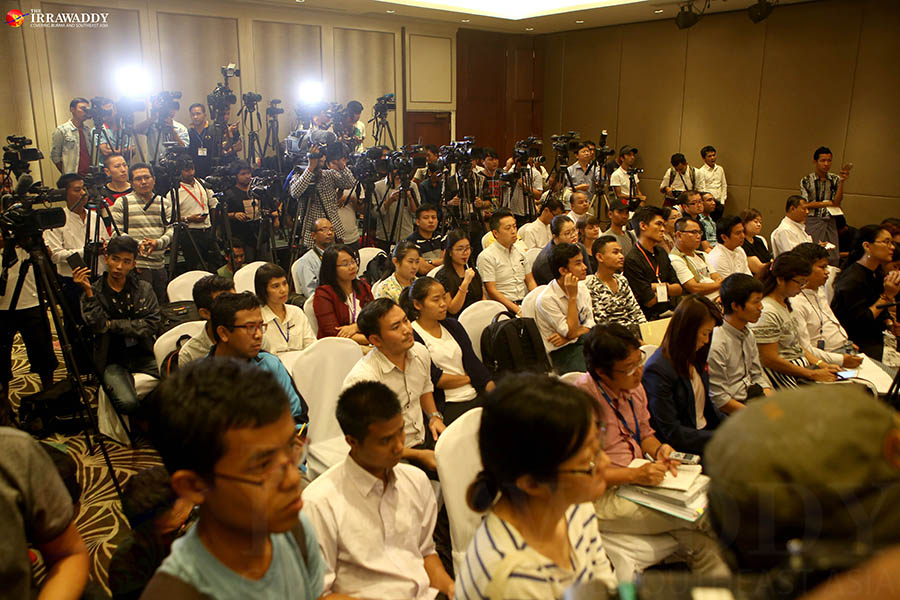RANGOON – UN Special Rapporteur on Human Rights in Myanmar Yanghee Lee told reporters on Friday that she would “strongly urge the government” to allow an international independent body to investigate allegations of rights abuses particularly in Rakhine State, and in conflict regions in Myanmar at large.
The comment was made during a press conference in Yangon after Lee wrapped up a 12-day visit to Myanmar. She went to Yangon and Naypyitaw and toured conflict-torn Rakhine State, but noted that in Shan State, she was only allowed to visit the northern city of Lashio, and the capital of Hpa-an in Karen State. On her trip, Lee met with internally displaced people as well as with civil society organizations, but noted that many of the places she had proposed visiting were denied access to her by the authorities.
“I regret Myanmar’s decision to refuse the fact-finding mission,” Lee said in reference to the UN body appointed by the Human Rights Council to investigate rights violations in conflict areas in Myanmar, the participants of which have seen their applications for visas refused. Reporters raised questions about why Lee felt the mission was necessary.
She noted that her own mandate—extended for one year—is separate from that of the fact-finding mission. But she pointed to evidence that requires an “independent international mechanism” in order to be verified, and the need “to collect data and just know…what really happened.”
Of particular concern to the fact-finding mission are clearance operations carried out by security forces in northern Rakhine State in response to militant attacks on police outposts in October 2016; during this time, tens of thousands of self-identifying Rohingya Muslims were displaced to Bangladesh.
Lee expressed dismay that her visit was marked by many restrictions, with authorities providing “the excuse of short notice” in denying her access to sites, and her sources reportedly facing intimidation by special branch police officers.
Those who met with her, Lee said, were “photographed, questioned before and after meetings, and in one case, even followed.” This, she added, was “unacceptable.”
“I am disappointed to see the tactics applied by the previous government still being used,” the Special Rapporteur said.
She acknowledged that the “general situation for the Rohingya has hardly improved” since her last visit in January, and that she continues to receive reports alleging violations by security forces. Lee lamented that she has also learned that some Rohingya who had collaborated with the authorities have been harmed or killed by unknown assailants.
During her visit to Rakhine State, Lee faced protests in Buthidaung Township, and in the capital Sittwe, as local Buddhist Rakhine said they felt she stood for the rights of the Rohingya community but portrayed the Rakhine as villains on the international stage. In her statement, she explained that members of the Rakhine community emphasized to her “that the Rakhine community as a whole should not be judged for the action of its most extreme members.”
“I am here to report what I see and what I can clarify myself for the all people, not just one side,” she said.

Lee said her delegation had planned to meet with community members in northern Shan State, as well as three journalists currently detained in Hsipaw prison, accused by the Myanmar Army of violating the Unlawful Associations Act for gathering news by contacting the ethnic armed group the Ta’ang National Liberation Army. The authorities did not allow her to visit Hsipaw, she said, although it is a known tourist destination.
During her time in Myanmar, Lee met with State Counselor Daw Aung San Suu Kyi and officials from several Union ministries, but was unable to meet Tatmadaw commander-in-chief Snr-Gen Min Aung Hlaing, or the ministers of defense, home affairs, transportation and communication, or religion and culture. She did not comment on the content or outcomes of these meetings.
The State Counselor’s Office issued an official response to Yanghee Lee’s statement on Friday defending its “disassociation” with the Human Rights Council’s resolution to appoint a fact-finding mission, and expressed “disappointment” with Lee’s conclusions, claiming that her remarks contained “sweeping allegations and a number of factual errors.” The Office stated that during meetings with Lee, representatives had explained to her “the steps that the government has taken to promote development and communal harmony.”
On Tuesday, Myanmar National Security Advisor U Thaung Tun and Union Minister U Kyaw Tint Swe of the State Counselor’s Office held a press conference at the National Reconciliation and Peace Center, inviting dozens of foreign counterparts from Yangon-based embassies, including US Ambassador Scot Marciel. But the advisor declined to take questions from reporters and requested to leave the conference room before a discussion began between diplomats.
In his opening remark, U Thaung Tun said that the UN’s fact-finding mission “would only aggravate” tension between Muslims and Buddhists in Rakhine State and described it as “less than constructive.”
Yanghee Lee is scheduled to submit a report on the human rights situation in Myanmar to the Human Rights Council in Geneva in October.

















